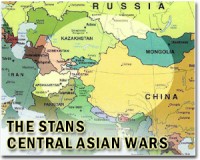 |
Kabul (AFP) Dec 28, 2010 US strategy to defeat Al-Qaeda and the Taliban tripled American troops fighting in Afghanistan and doubled missile strikes in Pakistan, but ushers in a make-or-break 2011 after a year of record violence. Since taking office, President Barack Obama ordered more than 50,000 extra troops into battle to reverse Taliban momentum and build up Afghan government forces so that combat troops could start leaving in 2011. There are now 140,000 US-led NATO troops on the ground -- two-thirds of them American -- and 2010 has proved to be the deadliest year on record with the deaths of at least 707 foreign soldiers, or an average of two a day. The United Nations declared the first 10 months as 20 percent deadlier for Afghan civilians than the same period in 2009. The Taliban have made increasing inroads into the north and west. Killings and kidnappings of Western aid workers have put much of rural Afghanistan, which suffers from huge poverty and social problems, off-limits. In a damning assessment of America's key ally, US memos leaked by whistleblower website WikiLeaks said no amount of aid money would ever convince Pakistan to abandon support of the Afghan Taliban. Nevertheless, Obama treated the United States to a cautious one-year review of the surge, saying strategy was "on track" and that progress was sufficient to permit a "responsible reduction" of US forces in July 2011. Gains were fragile and reversible, the president acknowledged, but Al-Qaeda was now weaker than ever since the 2001 US-led invasion of Afghanistan even if the network was still planning follow-ups to the September 11, 2001 attacks. The fact that he himself stayed only three hours under the cover of darkness and never left Bagram Air Field during a visit to American troops on December 3 spoke volumes about the real state of security. The White House attributed the decision to bad weather and the Afghans insisted there were no hard feelings, but the cancellation of talks with Karzai in Kabul did nothing to dispel fears of a fraying political alliance. There are still four years before the international community aims to hand over responsibility for security to the Afghan government. Even Petraeus, the lauded US general who took over from the sacked Stanley McChrystal in June, has expressed doubt about victory by 2014, admitting that a "resilient" Taliban, squeezed out of some areas, simply pops up in others. Questions about diplomatic continuity have also been raised by the death of Obama's special representative to Afghanistan and Pakistan, Richard Holbrooke, and the decision to replace him by his much less well-known deputy Frank Ruggiero. David Cameron, prime minister of Britain, which after the United States contributes the most foreign troops to Afghanistan, has said that progress made in 2010 must become "irreversible" in 2011. Despite escalating drone strikes, Washington still considers Pakistan's tribal belt on the Afghan border the most dangerous place on Earth, the global headquarters of Al-Qaeda and a rear base for Afghan Taliban. According to an AFP tally, around 100 drone strikes have killed more than 650 people since January 1, compared to 45 killing 420 people in 2009. But there seems no shortage of Islamist extremists willing to attack the West. A bomb plot in New York on May 1 was hatched by a financial analyst trained in Pakistan's North Waziristan. Alleged plots to attack Europe in October were also rooted in Pakistan's tribal belt, Western intelligence agents said. Politically, the Afghan and Pakistani governments seem weaker than ever, tainted by corruption despite near unconditional financial support running into billions of dollars from Washington. US ambassador Karl Eikenberry wrote in one cable that Karzai was "paranoid and weak" and "unfamiliar with the basics of nation building", raising the question as to whether Washington can succeed without a solid partner in Kabul. Parliamentary polls that the West hoped would clean up massive fraud that marred Karzai's re-election in 2009 threw out a quarter of votes for graft. In Pakistan, the popularity of President Asif Ali Zardari sank to new lows as catastrophic flooding left a fifth of the country under water, affected 21 million people and saw the already faltering economy take a further nosedive. Zardari's weak government has no hold over the military, which has withstood US pressure to launch an offensive against Afghan Taliban and the Haqqani network in North Waziristan. Pakistan, the only nuclear power in the Muslim world, has lost nearly 4,000 people over the last three years in a series of suicide and bomb attacks blamed on Taliban allied to Al-Qaeda, including more than 1,000 people in 2010.
Share This Article With Planet Earth
Related Links News From Across The Stans
 Philippines denounces rebel 'extortion' ahead of talks
Philippines denounces rebel 'extortion' ahead of talksManila (AFP) Dec 28, 2010 Philippine President Benigno Aquino's government on Tuesday denounced communist rebel extortion of businesses, which his spokeswoman said could scare away investments and jobs. The government has learnt seven mining firms in the main southern island of Mindanao are threatening to pull up stakes after the New People's Army (NPA) demanded they pay up or face attacks, Aquino spokeswoman Abigail ... read more |
|
| The content herein, unless otherwise known to be public domain, are Copyright 1995-2010 - SpaceDaily. AFP and UPI Wire Stories are copyright Agence France-Presse and United Press International. ESA Portal Reports are copyright European Space Agency. All NASA sourced material is public domain. Additional copyrights may apply in whole or part to other bona fide parties. Advertising does not imply endorsement,agreement or approval of any opinions, statements or information provided by SpaceDaily on any Web page published or hosted by SpaceDaily. Privacy Statement |